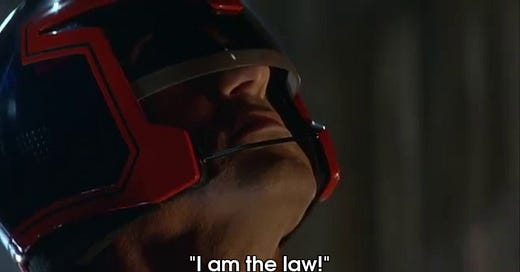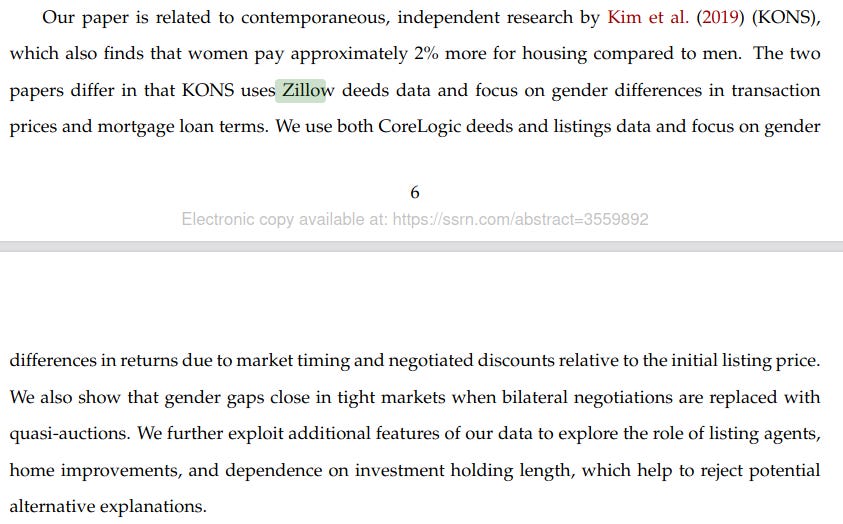About a month ago, an anonymous EJMR thread popped up alleging plagiarism by a pair of professors at the Yale School of Management (SOM), Dr. Paul Goldsmith-Pinkham & Dr. Kelly Shue. This EJMR thread quickly racked up 143 upvotes and 2 downvotes, instantly becoming one of the top threads of the year. This thread shows that their forthcoming paper, “The Gender Gap in Housing Returns”, which was published in the top finance journal in the world, Journal of Finance, is almost identical to a paper from 3 years earlier “Gender Price Differentials in the Housing Market: Evidence from a Repeat-Sales Approach” which was published in Economic Bulletin, a much lower ranked journal. The authors of this original article are at the University of Oklahoma and Kansas State University.
**It should be noted that, ironically, that in the body of this article about plagiarism, I steal many phrases and ideas from that original EJMR thread.
According to the Merriam-Webster online dictionary, to "plagiarize" means:
1. to steal and pass off (the ideas or words of another) as one's own
2. to use (another's production) without crediting the source
3. to commit literary theft
4. to present as new and original an idea or product derived from an existing source
This Yale case violates 1), 2), & 4). They did not violate 3) because they don’t go so far as to copy-paste chunks of text verbatim from the first paper. Other than that, it is the same paper. A group of researchers from a lower-ranked school show that women pay 2% more for mortgages, and then a group of researchers from Yale also find that women pay 2% more. This is plagiarism... they are caught red handed.
This case is bigger than just 2 sleazy thieves; it exemplifies the rot, corruption, rent-seeking and power dynamics that characterize finance academia. It shows that if you have the right connections you can publish crappy, useless, plagiarized papers at the top finance journal in the world. The value of an idea now depends on the authors affiliations.
Oh — did I mention Kelly Shue is an associate editor JF? That’s right: an AE at JF strategically committed research misconduct in order to publish this crap in her own journal. Talk about having a brass set of ladyballs.
So how does a paper in a low tier journal by unknown authors get recycled by famous authors into a JF publication? By strategically “forgetting” to cite the original paper.
This is not the first time Shue has strategically omitted citations — her 2018 paper on stock splits doesn't even cite the literature on stock splits that found the same exact result. Sadly, such behavior is commonplace in finance academia and at the JF. Take for example the case of Bryan Kelly, an associate editor at JF, who in a 2014 paper on liquidity dropped citation of identical 2011 paper with the same question and same identification strategy. There are previous versions of the 2014 paper which actually cite the 2011 paper, so it was deliberately dropped before publication.
The Woke Angle
It is worth noting that this Yale paper only got accepted in the first place because it is about gender issues written by a woman.
The media ate it up, and this paper was covered in The Economist, NPR, CNBC, Barron's, bizwomen, RISMedia, Domain, TheRealDeal, MReport, REALTOR, Register. It also won best paper award at the annual Western Finance Association Conference.
The “Contemporaneous” Excuse
The coverup is always worse than the crime because it confirms deliberate intent.
I contacted JF to inform them of this plagiarism. Here is the initial response I received:
Chris,
I handled this paper and I'm now aware of the issue.
Retraction can only happen for published papers. This paper is neither published, nor accepted for publication at this stage.
Best,
[Executive Editor of JF]
I was satisfied with this. They were looking into it, and I naively thought maybe they might even take it seriously. Sadly, shortly thereafter a new version of the paper emerged on SSRN with an added paragraph which handwaves this plagiarism away as “contemporaneous” work:
It is laughable and immensely dishonest how Paul and Kelly characterize their paper as "contemporaneous." Terrible damage control, and it shows they have no intent of apologizing or coming clean. They think they are immune from consequences because they are Yale professors. They are not expected to follow the rules, rules are what they do.
How can it be contemporaneous if the others did it first? The first paper is *prior* work, not *contemporaneous* work. Here is the timeline:
2018: First put their paper on SSRN
2019: First paper is published in Economics Bulletin
2020: Kelly and Paul put their paper on SSRN
So, the contemporaneous excuse does not hold water. If they are going to say contemporaneous, then the onus is on them to prove that with some sort of timeline with verifiable dates. They should have simple feigned incompetence and said “Sorry, we missed the other paper in our literature review!” (even though a 2 minute search on Google Scholar would have yielded the first paper) but instead they chose to double down and say contemporaneous.
The probability that Kelly and Paul weren't aware of the other paper is almost zero. Kelly presented her paper at the University of Oklahoma on June 26th, 2020. Three out of the four authors that she stole this paper from are PhD students or professors at the University of Oklahoma. Am I supposed to believe no one mentioned an identical paper from their department asking the same question with the same results?
The coverup continues. Here is the conference where the previously published paper was allegedly brought to their attention. Notice anything odd? The only presentation where the link to the paper has been taken down? You guessed it. “The Gender Gap in Housing Returns.”
Is it Retracted or Not?
It is clear to me that this “contemporaneous” excuse is in violation of the American Finance Association Code of Professional Conduct and Ethics.
Item 6(a)(4) says: "Acknowledge prior and contemporaneous contributions of other researchers in publications, teaching, practice, and service settings based on their relevance."
The paper was accepted after they directly violated 6(a)(4) by failing to acknowledge prior work. They then violated the spirit of 6(a)(4) by later inserting a cite to prior contributions as contemporaneous.
This disingenuous correction then violates 6(a)(6): "Take reasonable steps, if they discover significant errors in their publication or presentation of data, to correct any such errors in a correction, retraction, or erratum."
So, I approached the AFA regarding this ethical breach. This is what they responded:
The AFA considers complaints about ethics issues that have direct relationships with official AFA business. The AFA Executive Committee and Board do not consider issues that arise outside of AFA business. For example, what authors upload to SSRN does not concern AFA business and hence does not constitute a basis for an ethical complaint the AFA would consider. In contrast, if the paper was accepted at the Journal of Finance, as indicated by being officially listed as forthcoming on the AFA website, then the AFA would consider a complaint. In this case, the paper is not listed as forthcoming on the Journal of Finance website and thus, there is no basis for considering this complaint according to AFA rules for consideration of ethical violations.
Thanks,
[Executive Secretary and Treasurer of the AFA]
“What authors upload to SSRN does not concern AFA business”? I will translate that from academic-ese for you: they are telling me to go fuck myself. I further pushed the AFA & JF leadership teams on this point. They say:
It would become AFA business if the version they uploaded on SSRN was accepted for publication in the JF.
And that gets to the crux of their argument. They maintain they can’t do anything because it is not “accepted for publication”…. and yet, it listed as forthcoming on Paul and Kelly’s CV. So it is forthcoming, but not technically accepted. Sure, okay, whatever.
Who cares if it is listed as forthcoming on the JF website? It is listed as forthcoming on both the author’s CVs, so it was clearly accepted. I pushed the JF on this point, and they further argue semantics:
The source of the confusion may be the meaning of "forthcoming". It is common practice that once a paper has cleared all substantial hurdles and only expositional changes, editors tell authors before formal final acceptance that they may refer to the paper as "forthcoming". Formally, however, at that point publication is not yet guaranteed as there are still conditions the authors must satisfy (e.g., provide replication code, address expositional issues, but also other things that may come up).
I said that the paper is not accepted at this point and this is all I can say. In my email to you I only explained that, in general, there is a difference between what is informally labeled ."forthcoming" and a formal acceptance In most cases, this distinction doesn't matter. Sometimes it matters.
I asked them if they could retract it. They say:
It's not possible to retract this paper because only published papers can be retracted. The paper has not been published, neither in the journal, nor as early view online publication on the Journal's website
So where does that leave us? The paper is still “Forthcoming” but not “Officially Accepted.” There is no resolution yet. Let’s see if JF does the right thing and torpedoes the paper. In a just world, this would also torpedo the careers of Kelly, Paul, and the Yale, JF, and AFA leadership teams involved in sweeping this under the rug.
What is funny in all this is that Yale SOM is the loudest voice in the profession when it comes to ethics — they are constantly screaming from rooftop that they are interested in the greater good, and constantly brag about how "we equip our students with the highest set of values." If Yale SOM take no action here — in a clear case of egregious unethical conduct — they will be telling their students to go fuck themselves. This remains to be seen.









Room temp iq writer that doesn't understand how research works.
You also may want to investigate Berk, Odean, Barber, and Hung. They did the same thing a few years ago.